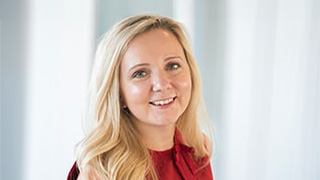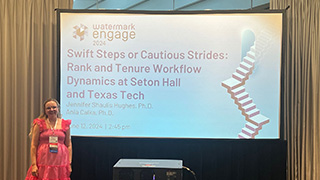Navigating the Future of Higher Education: Anna Calka's Experience at Engage 2024 Conference
Thursday, June 27, 2024
 In June 2024, Anna Calka, Ph.D., director of Advising and Technology Integration at
Seton Hall University, had the privilege of presenting at the Engage 2024 conference
hosted by Watermark. Held from June 11-13 at the Marriott City Center in Minneapolis,
this annual event gathered higher education professionals to share insights and explore
innovative solutions to enhance academic operations and student success.
In June 2024, Anna Calka, Ph.D., director of Advising and Technology Integration at
Seton Hall University, had the privilege of presenting at the Engage 2024 conference
hosted by Watermark. Held from June 11-13 at the Marriott City Center in Minneapolis,
this annual event gathered higher education professionals to share insights and explore
innovative solutions to enhance academic operations and student success.
Setting the Stage
Engage 2024 offered a dynamic environment for discussions on transformative impacts in higher education, particularly reflecting on the progress made since the COVID-19 pandemic. Brittany Packnett Cunningham's keynote address set a powerful tone, emphasizing the critical role educators play in building students' confidence and authenticity. Her assertion that "educators are the architects of confidence" resonated deeply, providing a thoughtful backdrop for the conference.
Presentation: "Swift Steps or Cautious Strides: Rank and Tenure Workflow Dynamics at Seton Hall and Texas Tech"

On June 12, Calka co-presented a Swiftie-inspired session with Jennifer Shaulis Hughes, Ph.D., from Texas Tech University, titled "Swift Steps or Cautious Strides: Rank and Tenure Workflow Dynamics at Seton Hall and Texas Tech." This presentation delved into the complexities of modernizing faculty rank and tenure processes, focusing on the transition from paper-based systems to streamlined digital workflows.
Exploring the Transition
At Seton Hall University, Calka led a significant initiative to replace the traditional, cumbersome paper-based tenure and promotion system with a more efficient digital solution. This transition was driven by the need for increased transparency, accessibility, and efficiency. The presentation outlined several key aspects of this transformation:
- Initial Challenges and Stakeholder Management:
- Calka discussed the initial challenges faced in moving away from paper-based workflows. These included addressing the diverse expectations of various stakeholders and aligning the new system with multiple faculty guides and institutional policies.
- Effective communication and thorough stakeholder engagement were crucial in overcoming resistance to change and ensuring broad-based support for the new system.
2. Designing and Implementing the Digital Workflow:
- The design and implementation phase was a meticulous process. Calka emphasized the importance of involving end-users in the design process to tailor the system to meet their needs effectively.
- Comprehensive testing and training were critical components. The team conducted extensive pilot tests and training sessions to ensure a smooth transition and to equip faculty and administrators with the necessary skills to use the new system effectively.
3. Ensuring Continuous Improvement:
- Post-launch, Calka highlighted the importance of feedback loops. Gathering and analyzing user feedback allowed the team to make iterative improvements to the system, enhancing its functionality and user experience.
- Regular updates and refinements were essential to address any emerging issues and to adapt to evolving needs within the university.
Insights from Texas Tech University
Shaulis Hughes complemented Calka's insights by sharing the experiences from Texas Tech University. Together, they explored the similarities and differences in their approaches, providing a comprehensive view of how institutions can navigate the complexities of digitizing rank and tenure processes.
- Institutional Contexts and Customization:
- They discussed how institutional context influenced their approaches. Texas Tech faced unique challenges that required customized solutions to fit their specific administrative and faculty requirements.
- The need for flexibility and customization in digital systems was a recurring theme, highlighting that a one-size-fits-all approach is rarely effective in higher education settings.
2. Collaboration and Best Practices:
- Both presenters stressed the importance of collaboration between different departments and stakeholders. Engaging a wide range of voices in the process was key to achieving buy-in and ensuring the system met diverse needs.
- Sharing best practices and lessons learned between institutions proved invaluable. The exchange of ideas and strategies helped in refining their approaches and avoiding common pitfalls.
Reflections and Future Directions
Calka's participation in Engage 2024 was a professionally rewarding experience. The presentation at Engage not only showcased Seton Hall University's advancements but also provided a platform for fruitful discussions on digital transformation in higher education.
Reflecting on the session, Calka emphasized the importance of continuous improvement and adaptability in implementing new technologies. The insights gained from presenting and engaging with peers will be instrumental in further refining the rank and tenure process at Seton Hall.
Looking ahead, Calka is committed to leveraging these experiences to enhance academic processes and support faculty success at Seton Hall. The journey towards excellence in higher education is ongoing, and sharing knowledge at conferences like Engage is crucial in driving collective progress.
Categories: Education






